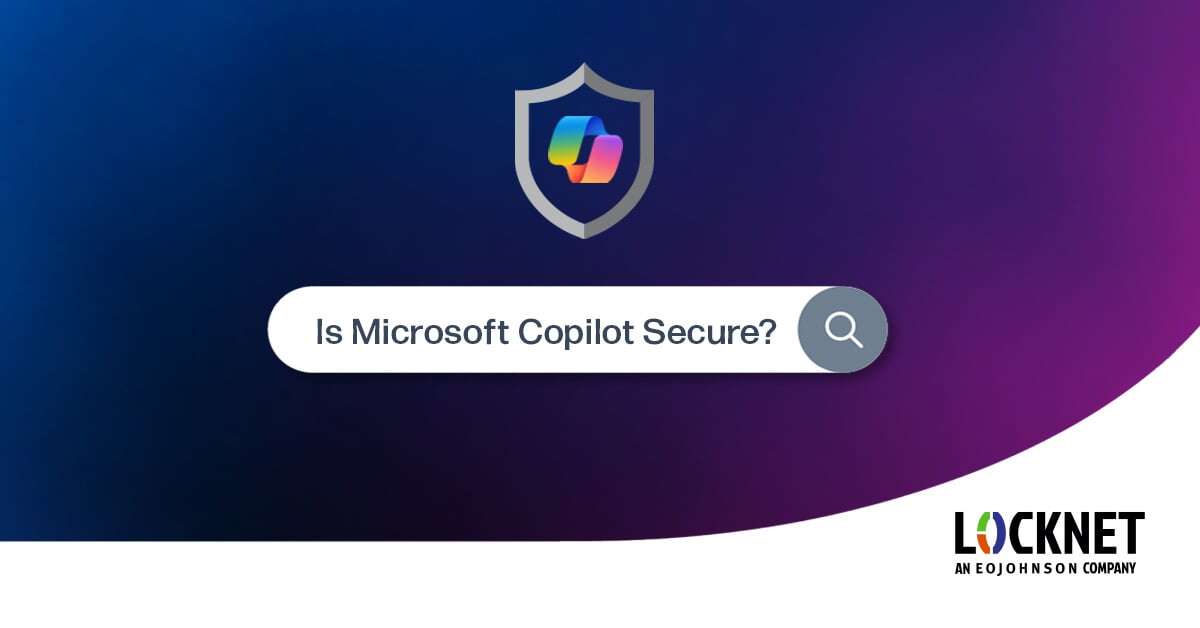World Class IT Support & Service
Real People. Right Now.
About Locknet® IT Services
From the first hello, the Locknet® team is dedicated to serving you and your needs.
Real People. Right Now.
From the first hello, the Locknet® team is dedicated to serving you and your needs.


Microsoft Copilot is a game-changer for businesses, boosting productivity by integrating artificial intelligence (AI) into tools like Word, Excel, and Teams. But with this opportunity for innovation and efficiency comes an important question: Is Microsoft Copilot secure?
For businesses considering adopting Copilot, understanding its security features and knowing how to protect sensitive data is crucial. Let’s break this down.
Microsoft Copilot is built on the robust security framework of Microsoft 365. Here are key reasons why it’s considered a secure artificial intelligence tool:
Microsoft prioritizes data privacy in Copilot. It doesn’t use customer data to train AI models. Instead, your business data stays within your tenant, meaning your organization maintains ownership and control over its information.
Copilot leverages Microsoft 365’s built-in security features. Tools like Azure Active Directory (AAD) and Microsoft Defender provide identity protection and threat detection, ensuring only authorized users can access sensitive files.
Data shared between Copilot and Microsoft applications is encrypted both in transit and at rest. Encryption prevents hackers from intercepting or accessing your information during transmission.
Microsoft complies with industry-leading standards, such as GDPR, HIPAA, and ISO/IEC 27001. These certifications demonstrate that Copilot is designed to meet the strict security requirements of regulated industries.
Keeping proprietary data confidential is important, and Copilot has built-in safeguards to help ensure it stays that way. But you are likely to still have questions. Here are some common questions you may have about data security with Copilot:
Because Copilot inherits all your existing Microsoft 365 security and compliance requirements, it’s important to have established content management practices and data governance in place before rollout begins. Audit the data access conditions, retention controls, and sensitivity labels you already have set up.
Microsoft 365 Copilot only surfaces organizational data to which individual users have at least view permissions. It's important that you're using the permission models available in Microsoft 365 services, such as SharePoint, to help ensure the right users or groups have the right access to the right content within your organization. This includes permissions you give users outside your organization through shared channels.
When you enter prompts using Microsoft 365 Copilot, the information contained within your prompts, the data they retrieve, and the generated responses remain within the Microsoft 365 service boundary, in keeping with our current privacy, security, and compliance commitments. Microsoft 365 Copilot uses Azure OpenAI services for processing, not OpenAI’s publicly available services. Azure OpenAI doesn't cache customer content and Copilot modified prompts for Microsoft 365 Copilot.
It’s a good idea to perform due diligence with any AI vendor you work with. Having said that, Microsoft 365 Copilot is integrated into Microsoft 365 and adheres to all existing privacy, security, and compliance commitments.
To maximize the benefits of Microsoft Copilot while ensuring security, companies must also implement their own robust policies and tools. Here’s what we recommend you have in place:
MFA requires users to verify their identity using two or more factors, such as a password and a phone notification. This adds an extra layer of protection against unauthorized access to Microsoft 365 accounts.
Review who has access to sensitive files and data. Ensure that access permissions align with job roles and revoke access for employees who no longer need it.
Conditional access allows businesses to set rules for accessing company resources. For instance, you can restrict Copilot access to specific locations or devices, reducing the risk of breaches.
Educate your team on cybersecurity best practices. Employees should know how to use Copilot responsibly, avoid phishing scams, and handle sensitive data securely.
Leverage Microsoft 365’s built-in monitoring tools to track data usage. Alerts can notify you of unusual activity, such as large data downloads or file-sharing with external users.
The zero trust model assumes that no user or device is automatically trusted. By verifying every access request, even within your network, you can reduce vulnerabilities.
Regularly update Microsoft 365 apps to ensure you’re running the latest versions with up-to-date security patches.
So, is Microsoft Copilot secure? The short answer is yes. Microsoft has taken significant steps to ensure that Copilot meets the highest security standards. However, security is a shared responsibility. Businesses must implement best practices, train employees, and stay vigilant against evolving threats.
With the right safeguards in place, Microsoft Copilot can become a valuable asset, helping your team work smarter while keeping your data safe. We recommend referencing our other Microsoft Copilot guides for more information, which include practical use cases for any industry, tips for writing effective Copilot prompts, and our Microsoft Copilot deployment guide.
If you’re a Locknet client considering Microsoft Copilot for your organization, now’s the time to talk to your Technical Account Manager and review your cybersecurity framework. The right preparation will ensure you can take full advantage of AI innovation without compromising security.
Microsoft

Onalaska, WI Waterloo, IA Wausau, WI Eau Claire, WI Burnsville, MN
You are now leaving locknetmanagedit.com. Please check the privacy policy of the site you are visiting.